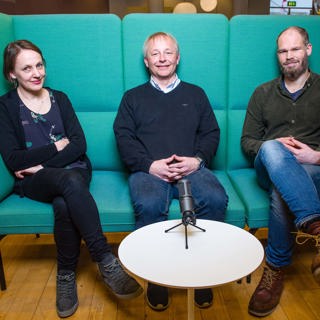
Zika, Penguins, Erratum, Fossil fish
The Zika virus is dominating the news this week. The latest data says it's been found in 21 countries so far. The symptoms are generally mild, but the possibility of a link to microcephaly has been raised in Brazil. Microcephaly is a serious condition where children are born with abnormally small heads and sometimes incomplete brain development. Trudie Lang, Professor of Global Health at Oxford University, and virologist Professor Jonathan Ball from Nottingham University discuss what we know so far.All the way from Antarctica our reporter Victoria Gill brings us the latest news about the citizen science project 'Penguin Watch'. Victoria installed new cameras with Dr Tom Hart and collected guano with Hila Levy. Gemma Clucas (Oxford and Southampton University) gives an update on what will happen with the collected data. Back in October we featured a major paper by a team of scientists lead by Dr Andrea Manica from Cambridge University. By comparing the 4500 year-old genome of a prehistoric man called Mota to other genomes from living Africans they had mapped a migration of Middle Eastern farmers back into the whole African continent. This week, colleagues identified an error in the way the original team had processed the data, thus overturning one of the key results. But the rest of the findings remain intact. Andrea talks to us about how and why science must make corrections along the path of progress.Heard a few stories about giant dinosaur fossils lately? Usually the giant A-list superstar fossils get all the attention. But according to curator Mark Carnall, about 90% of the collections are mainly uninteresting specimens. Marnie Chesterton went out to meet Mark at the Museum of Natural History in Oxford. He celebrates fragmentary fossils in his blog 'Underwhelming Fossil Fish of the Month'. Warning: Lower your expectations!Producer: Jen Whyntie Assistant Producer: Julia Lorke.
28 Jan 201628min

Ancient Britons' DNA, Concorde's 40th Anniversary, Giant dinosaur, New planet?
Our ability to extract DNA from old bones is improving, giving us a much clearer picture of who our ancestors were, and what they did. Two new papers out this week in Nature Communications are filling in some gaps in our knowledge of the history of Britain. One of the pieces of research - led by Professor Dan Bradley from Trinity College Dublin - examines DNA from individuals who died in northeast England at the beginning of the first millennium of the current era. The other paper analyses the genomes of East Anglian people who lived at a similar and slightly later time, and the lead author is Dr Stephan Schiffels. He worked at the Wellcome Trust Sanger Institute near Cambridge at the time of this research, and is now based at the Max Planck Institute for the Science of Human History. Professor Mark Thomas from University College London is a co-author on Dan Bradley's paper and joins Adam Rutherford to discuss this research in the context of its rapidly changing field.Concorde flew its first commercial flight on the 21st January 1976. To mark its 40th birthday, Concorde engineer Christopher Mitchell and Concorde pilot David Rowland talk about the extraordinary aeroplane's scientific and engineering legacy.What looked like an innocent rocky outcrop in the Argentinian desert turned out to be something completely different: An eight foot long femur, belonging to the world's largest dinosaur. Ben Garrod is one of the team who has put together this as yet unnamed behemoth. He talks us through the extraordinary discovery and journey to investigate a new species - and it's only just beginning. The work has been documented as part of the TV programme 'Attenborough & the Giant Dinosaur', due to air at 6.30pm this Sunday 24th Jan on BBC One.Finally, today's headlines indicate that we might have been missing something fairly substantial in our very own solar system: A new ninth planet. However, as BBC Science Correspondent Jonathan Amos tells us, this isn't yet confirmed. With Dr Ellen Stofan, NASA Chief Scientist.Producer: Jen Whyntie.
21 Jan 201628min

The 100,000 Genome Project, Stem cell doping, Nuclear waste, Dinosaur sex
The 100,000 Genome Project aims to sequence the DNA of 100,000 patients. One of those patients is four-year-old Georgia Walburn-Green. Her symptoms did not fit into any known disease category. Prof Maria Bitner-Glindzicz at University College London used early results from the 100,000 Genome project to diagnose Georgia's condition.Roland Pease reports on helping stem cells survive using a kind of 'blood paint'. By dipping the cells in myoglobin, researchers at Bristol University have found a way to improve both the vigour and survival of stem cells.The expanding nuclear programme in the UK will continue to produce nuclear waste - in lower volumes than previously produced, but we already have a large stockpile that has already been produced over the last 50 years. Countries around the world are facing a similar challenge: What do we do with the waste? Dame Sue Ion, engineer and expert advisor to the nuclear industry, discusses common practices and alternative approaches to nuclear waste disposal.Many dinosaurs had big, iconic features like frills, plates, horns and spines that may have been tools or weapons, but Dr David Hone's (Queen Mary University of London) research on the small, herbivorous dinosaur Protoceratops andrewsi reveals that they may also serve another purpose in the dinosaur society: sexual selection. Could these features be what attracts one dinosaur to another?Producer: Deborah Cohen and Jen Whyntie Assistant Producer: Julia Lorke.
14 Jan 201628min

El Nino Special
El Niño is releasing vast quantities of heat normally stored in the Pacific, causing floods, droughts and fires. Adam Rutherford discusses the latest with our El Niño expert Roland Pease.This weather event arrives every 2-7 years but it's hard to work out how profound it will be. Back in May last year, the Met Office climate scientist Adam Scaife correctly predicted an El Niño. He returns to give an overview of this phenomenon.How does an altered weather pattern in the Pacific end up altering the weather in Cumbria. Tim Stockdale at the European Centre for Medium-Range Weather Forecasts and Richard Allan at Reading University explain the science behind the current events.The rains are coming to drought-ridden California as a result of El Niño. Jack Stewart explains why this is not entirely a good thing.Professor Sue Page from Leicester University and Professor Martin Wooster from KCL study the Indonesian fires exacerbated by an El Niño event. They describe the devastating effects of these fires. An estimated 15,000 death can be attributed to the previous El Niño burning and it has added 300 million tonnes of carbon dioxide to the atmosphere.
7 Jan 201627min

31/12/2015
Adam Rutherford and guests oceanographer Dr Helen Czerski, astrophysicist Chris Lintott and zoologist Dr Tim Cockerill share their highlights of the science year and answer listeners' science questions.Producer: Adrian Washbourn.
31 Des 201528min

New Horizons Pluto update; friendly predatory bacteria; Christmas in the lab; human ancestry
Since the epic flyby of Pluto in July, NASA has been regularly downloading staggering images from the New Horizons mission. Pluto is not a dead rock, but a geologically active dwarf planet, with tectonic movements, ice plains, glaciers, dunes and cryo-volcanoes. For an end of year update on the observations and outstanding mysteries, Adam meets Alan Stern, the Principal Investigator on New Horizons, who is still marvelling at the success of this humble craft. Scientists have discovered how a potentially useful predatory bacterium called Bdellovibrio protects itself against its own weapons when it invades other bacteria. Professor Liz Sockett discusses how the work offers insights into early steps in the evolution of bacterial predators and how this will help to inform new ways to fight antimicrobial resistance Science stops for no one .So how are researchers nurturing their experiments over the festive period? Marnie Chesterton has gone on the hunt for scientists for whom Christmas Day will be yet another day in the lab.This year there's has been an explosion of papers of using DNA to reconstruct human history. We've invented new techniques for extracting DNA from the long dead, and for analysing ancient genomes. Professor Matthew Cobb from the University of Manchester assesses recent key developments in reconstructing the lives and population structures of ancient civilisations.Producer Adrian Washbourne
24 Des 201527min

Tim Peake's mission to the ISS, Spaceman Chris Hadfield, AGU round-up, Air pollution, Human Evolution at the NHM
Two times shuttle captain, and with 6 months on the ISS, Commander Chris Hadfield is best qualified to pass on his advice to Major Tim Peake about the science and life in general on the International Space Station.Polar bears walk further Polar bears are having to walk further to stay in the same place. As ice melts in the Arctic, the thin ice is blown around by the wind, making it harder for polar bears to stick to their traditional hunting grounds.Elephant Deterrent By combining a seismic element to the infrasound of recordings of elephant alarm calls, researchers hope to finally develop an audio deterrent to keep marauding elephants from destroying farmland in Africa.Tracking air pollution from space The US space agency satellite, Aura has been tracking trends in emissions of nitrogen oxides for over a decade. It's seen big falls in the pollutant in the US and Europe, while at the same time recording significant increases in some developing nations, such as China and Bangladesh.Air pollution Even if the air pollution trends are getting better in the West, the picture is still very complicated. Not least in London, where nitrogen oxides are still at dangerous levels. Added to this is a rise in smoke pollution from the increasing number of wood burning stoves in the city.Human Evolution Gallery at the Natural History Museum A new gallery of Human Evolution at the Natural History Museum opens on Friday 18th December. Adam gets a sneak preview with Professor Chris Stringer and Dr Louise Humphrey. Spanning 7 million years of evolution, the gallery brings together key fossils and recent evidence such as a reconstructed skull and hand of Homo naledi. It builds up a picture of where we come from and what makes us human. And the picture is far more complex than previously thought, with multiple species living at the same time.
17 Des 201534min

Flooding, Scientific modelling, Magnetoreception, Escalators
Flood modelling As parts of Cumbria and Somerset remain on flood alert, Adam looks at the science that predicts floods. Are our flood defences good enough and is climate change behind the recent cluster of '1 in 100 year' floods? Flood modeller Nick Reynard from the Centre for Ecology and Hydrology explains.What is a scientific model? Prompted by a listener's question, Adam asks scientists what they mean when they say they "modelled the data". He explores the strengths and weaknesses of using models to represent things as diverse as the spin of planets and field choice of skylarks.Magneto-reception Is there a 6th sense? Since the 1960s, it has been generally accepted that animals have a sense of magnetism. This may help explain how some birds are able to migrate huge distances. However, ever since this discovery, the mechanism behind the reception of the Earth's magnetic field has remained a mystery. Scientists don't know which components are responsible for detecting the magnetism, hence the search for 'a biological compass'. The quest has united people from a range of disciplines such as animal behaviourists, chemists and quantum biologists. Are scientists getting any closer to finding the biological compass?Escalator experiment Regular commuters on the London Underground know instinctively to 'stand on the right and walk up on the left' when using the many escalators on the Tube. But in a three week trial at one of the busiest stations - Holborn - Transport for London staff are asking travellers to stand on both sides. The idea is to regulate the flow of traffic. Will it work?Producer: Fiona Roberts.
10 Des 201529min





















